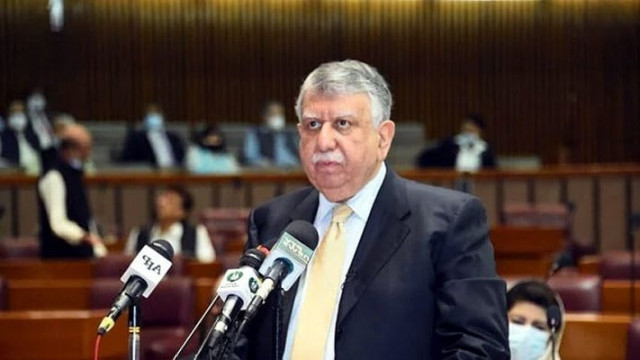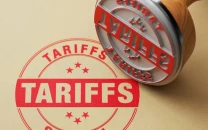PTI govt proposes Rs383b revenue measures
Sets Rs5.829 trillion tax collection target for Federal Board of Revenue

The federal government on Friday slapped at least Rs383 billion worth of additional taxes – and nearly 70% are regressive in nature and highly inflationary aimed at achieving the Rs5.829-trillion tax target.
The single largest tax measure is Rs1 tax on every call lasting more than three minutes, 10 paisa tax on every SMS and Rs5 tax on use of each 1 gigabyte (GB) of internet to generate Rs100 billion additional taxes.
Similarly, the government has also imposed 17% sales tax on import of crude oil to generate another Rs38 billion in taxes. However, the crude oil import tax estimates appeared on the lower end.
The government has imposed new taxes on almost every important consumable and daily use item, including sugar that will now be taxed at a retail stage and its price will go up by about Rs7 per kilogram. However, the industrialists and stock market players have been given relief in their tax burden.
“The government has proposed Rs383 billion gross revenue measures and has also given Rs119 billion tax concessions,” said Chaudhry Mohammad Tariq, Member Inland Revenue Policy of the Federal Board of Revenue (FBR) while briefing media about new tax measures. Tariq said that the net new revenue measures were Rs264 billion for fiscal year 2021-22, starting from July 1.
Read: Govt scales back tax target by Rs26b
At least Rs116 billion worth of additional income tax measures have been proposed by the government for the next fiscal year. Tariq said that the government has also given relief of Rs58 billion in tax, thus, the net impact of the income tax measures will be Rs58 billion.
Similarly, around Rs215 billion worth sales tax and federal excise duty measures have been taken in the budget. The government has also provided relief of Rs19 billion under the GST, bringing net impact of the GST and FED measures to Rs196 billion.
The government has slapped Rs52 billion worth of customs duties in the budget, said Syed Hamid Ali, Member Customs Policy of the FBR. He said that the government has also given Rs42 billion relief and the net impact of the customs duties will be Rs10 billion.
Tariq said that the government would also collect another Rs242 billion on account of administrative and enforcement measures.
These massive taxation measures suggest that Pakistan has almost accepted all the demands of the International Monetary Fund (IMF), except increasing direct burden of the salaried class. However, its single measure to impose tax on mobile and internet users will fetch revenue, which is more than what the IMF had asked to recover from the salaried class.
The IMF had initially asked to set the tax target at Rs5.963 trillion that has subsequently been downward revised.
In the present economic conditions, the taxation burden on one class of the society cannot be put and the decision to impose taxes on the mobile phone and internet users will spread the impact on all the people, said Tariq.
The annual cost of tax exemptions being given to various segments of the society and foreign investors has further jumped to a new record of Rs1.31 trillion – an increase of over 14% within a year in this fiscal year, showed Pakistan Economic Survey 2020-21. Cumulatively, the government has given Rs3.43 trillion in tax exemptions during three years, which is even more than the federal government's debt servicing cost.
Tariq said that the government has proposed Rs5.829 trillion tax collection target for the FBR, which is 24% higher than the anticipated downward revised collection of Rs4.7 trillion. He said that this target will be achieved on the back of Rs242 billion enforcement measures and net Rs264 billion taxation measures.
The Rs4.7 trillion collections will be equal to 9.9% of GDP while for the next fiscal year the government has set the target at 10.8% of GDP. It has proposed additional revenue measures for achieving this goal.
The government has also taken some measures, which will encourage informal economy. The federal excise duty on production in erstwhile FATA and PATA areas has been abolished, which will result into shifting of production to either in these areas or on papers the production will be shown in these exempted areas.
The government has also relaxed the turnover limit for small industry from Rs3 million to Rs10 million to exempt it from the requirement of availing the sales tax registration number. However, it proposed legislative changes to raid on the retail shops to check smuggled goods.
Customs measures
The government has proposed to increase regulatory duties on the import of the mobile phones to generate Rs16 billion additional revenues. Ali said that Pakistan imported Rs270 billion worth of mobile phones in this fiscal year, which needs to be discouraged.
It has also increased the customs duty on import of petrol from 5% to 10% but reduce the duty by 3% to 10% on high speed diesel, which it said would generate additional Rs4 billion in taxes. The government has also revised the duties on import of cars, which will result into additional revenue of Rs15 billion.
It, however, reduced customs duty on up to 850cc car from 30% to 15%, abolished 7% additional customs duty, and 15% regulatory duty. About 83 types of imported items including food and cosmetics have been taxed to generate Rs11 billion additional revenues.
The regulatory duty on tyres has been doubled to 10% to generate Rs5 billion.
Ali said that the government has reduced custom duties on use of items being imported by the textile sector. This will cost the kitty Rs12 billion. Similarity, Rs11 billion worth relief in customs duties has been given to the construction sector. The Rs6 billion worth relief has been given to the chemical importers by lowering custom duties.
Read more: Tax exemptions jump to record Rs1.31tr
Sales tax/FED
The government has imposed Rs1 per call tax on mobile users, 10 paisa per SMS and Rs5 per GB internet use to raise Rs100 billion. It has also imposed 17% GST on import of crude oil to generate Rs38 billion. About 23 items that were subject to reduced GST rate from 1% to 12% have been imposed with 17 sales taxes to generate Rs35 billion. These include silver, gold, jewellery, fat filled milk, LNG and RLNG.
Similarly, Rs14 billion will be generated by imposing 17% sales tax on cereals, milk and cream, frozen meat and sausages, fat filled milk. The online retail outlets have been slapped with 17% sales tax for the sake of Rs11 billion revenues. The point of sales related measures will generate Rs7 billion additional taxes.
The government has exempted industrial units located in FATA from 17% FED that will cause Rs5 billion loss. The sales tax on 850cc cars has been reduced to 12.5% that will cause Rs2.5 billion loss, said Tariq. The 5% FED on fruit juices has been abolished.
Income tax
The government has withdrawn tax concessions available on new investments by the industries to generate Rs65 billion taxes. The inter-corporate dividend has also been taxed at the rate of 15% to generate Rs5 billion revenues. Tariq said that Rs20 billion will be generated by streamlining the withholding taxes.
The interest income of above Rs5 million a year will be charged under normal tax regime to get Rs4 billion revenues. Similarly, the capital gains of above Rs5 million on sale of immovable property will be taxed under normal regime to generate Rs4 billion. The property income is also brought under normal tax regime to get Rs2 billion tax.
The export of services will be taxed at 1% rate to generate Rs5 billion.
The electricity bills of over Rs25,000 of non-filers of the income tax returns will be subject to 7.5% income tax.
The government has reduced the minimum turnover tax by 0.25% to 1.25%, for refineries to 0.5% and for fast moving consumer goods to 0.25% that will provide Rs15 billion relief, said Tariq.
Also read: ECC reviews tax exemption on Covid-19 imports
Similarly, the government has reduced the capital gains tax on stock market to 12.5% that will cause Rs2 billion revenue loss.
The government has abolished 12 types of withholding taxes that will cause Rs15 billion loss. These are related to banking transactions, air travel, stock exchange, CNG stations, petroleum products, international credit card transactions and extraction of minerals and sale of spices.
Enforcement measures
The government has proposed to collect Rs242 billion through enforcement measures. The government would collect additional Rs160 billion at domestic taxes stage without resorting to additional taxes. Another Rs82 billion are assured to be collected on account of customs duties-related administrative measures.
The government has promised the IMF that it would collect Rs30 billion on account of arrears stuck up at various stages while rationalising its earlier figure of Rs70 billion. It also hopes to collect Rs20 billion through audit and another Rs20 billion through enhanced monitoring of sales tax. It would collect Rs20 billion by installing track and trace system, also watering down its earlier wish of showing Rs50 billion under this head.
The collection of Rs50 billion has been shown under the head of integration of point of Sales of the retail shops. In customs, Pakistan has assured the IMF that it would generate Rs35 billion by curbing smuggling of tea, tyres textile and petroleum products.


















COMMENTS
Comments are moderated and generally will be posted if they are on-topic and not abusive.
For more information, please see our Comments FAQ